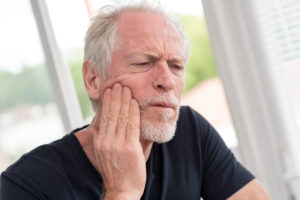October 6, 2022
The Surprising Connection Between Arthritis and TMD

As you may already know, arthritis is the swelling and tenderness of one or more joints. The Centers for Disease Control and Prevention (CDC) estimates that 24% of all adults, or 58.5 million people, are affected by arthritis. Many people think of this common condition as primarily affecting knees, elbows, and wrists. However, arthritis can also affect the joint that connects your jaw to your head. An Ann Arbor dentist breaks down the various ways arthritis is linked to temporomandibular joint disorder below.
What Is TMD?
Located on both sides of your head, the temporomandibular joint is the point where your jawbone connects to your upper skull. These two joints enable the movements required to chew, speak, laugh, and yawn. Problems related to this complex joint are collectively known as temporomandibular joint disorder, or TMD.
Arthritis and TMD
Determining the root cause of TMD is complex and can involve various factors, including stress, missing teeth, and dental infections. However, researchers are also beginning to better understand the different ways arthritis can affect TMJ pain in Ann Arbor.
Infectious arthritis
Adjacent infections can sometimes spread into the temporomandibular joint and cause inflammation. Infectious arthritis often limits jaw movement and is the source of considerable pain. If left untreated, it can even lead to permanent joint damage. Treatment of this type of arthritis typically includes antibiotics, proper hydration, pain control, and motion restriction. Once the infection is controlled, passive jaw-opening exercises help prevent scarring and limitation of motion.
Osteoarthritis
The TMJ may be also affected by osteoarthritis, especially if you are 50 years or older. This type of arthritis is characterized by stiffness, a grating sound on jaw movement, or mild pain. Wearing an oral appliance during sleep (and possibly while awake) may help alleviate pain and reduce grating sounds.
Secondary Degenerative Arthritis
This type of arthritis usually develops in people aged 20 to 40 years old with a history of trauma or persistent myofascial pain syndrome. Women are more likely to develop secondary degenerative arthritis than men. People affected often experience pain during jaw movement, joint tenderness, and popping or clicking when opening and closing their mouths. Consistently wearing an oral appliance except when eating or brushing teeth usually relieves symptoms.
Rheumatoid Arthritis
The TMJ is affected in nearly 20% of adults and children with rheumatoid arthritis. Pain, swelling, and limited movement are among the most common symptoms. To treat rheumatoid arthritis of the TMJ, your doctor or dentist may prescribe nonsteroidal anti-inflammatory (NSAID) drugs. In addition, wearing an oral appliance while sleeping often helps make symptoms subside.
Traumatic Arthritis
Finally, although rare, acute injury (e.g., due to a difficult tooth extraction) may lead to arthritis of the TMJ. Traumatic arthritis can lead to pain, tenderness, and jaw movement limits. Your dentist or doctor may prescribe oral corticosteroids or nonsteroidal anti-inflammatory drugs (NSAIDs). Applying heating pads, eating a soft diet, and restricting your jaw movement may also provide relief.
How a Dentist Can Help
Jaw pain caused by arthritis can be a major drag on your quality of life. If you’re experiencing any of the symptoms described above, don’t hesitate to ask your dentist in Ann Arbor about TMD treatment.
About the Author
Dr. James Olsen has over 30 years of experience working in the dental care industry. He is an active member of the International College of Cranio-Mandibular Orthopedics (ICCMO) and has completed advanced training in TMJ therapy. To learn more about the link between TMD and arthritis, visit Dr. Olsen’s website or call 734-996-0200.
No Comments
No comments yet.
RSS feed for comments on this post.
Sorry, the comment form is closed at this time.

